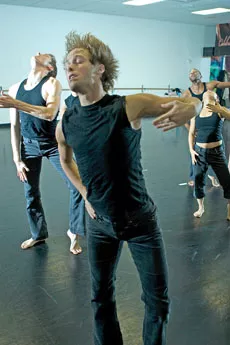Page 4 of 6
Walt: [laughs] So you really are in show business.
Ai Fujii Nelson (dancer): Mine was pretty basic, a dancer, a sister, friend, Japanese, a musician, a Buddhist.
Keenan: The words I came up with to describe myself were individual, as well as a member of a group, artist, creator, brother, son, friend, gay. A lot of the other dancers said words that best described me were “a go-getter,” “motivated.”
Perez: It’s a tough question.
Hunter: The thing that touched me about working with Jesus and Marisela is their honesty. They are very direct. I love that. There’s very little censorship involved. I saw it in Jesus’ artwork, read it in Marisela’s poetry. We have a community of kids. We communicate through the art first, then we get to know each other, then we get to share things and build trust and pretty soon, I’m a grandfather.
Silva: You’re describing yourself. He helped me a lot. I describe myself like honest and funny and … honest.
CW: And Marisela. How would you describe yourself?
Perez: Lost.

CW: What did you mean by “lost?”
Perez: You think you’re one thing, then the next week you find out you hate that about yourself.
Hunter: Marisela’s really tough, she’s not afraid, she won’t back down from anything.
[Afterwards, Perez says such toughness is an exterior only. “I’m all torn up inside,” she says, “just a scared little girl.”]
CW: [To the dancers] When you started this, did you look at Jesus’s paintings or Marisela’s poems?
Blake: Charlotte and [development and community-affairs director] David [Pace] did. They were putting together the process. That’s how she was motivated by their ideas. Now we’ve finished the piece we’ll be able to dive in on our own. Not focus on the movement anymore but focus on why we’re here and give our all. For me, I do see an intensity, such a great relationship between us but one where you have to have an aggression, fighting with yourself in the piece.
CW: Marisela, some of your poems are about family and the struggle to communicate. Did you see that in the dance?
Perez: It seemed like one minute they were all together, then they were all pushing back, that back and forth kind of thing.
Hunter: [claps his hands] That’s it. It’s family. That’s what it is. It’s the dynamics of their family.
Nelson: It really helps to see what Jesus and Marisela see, then dance that.
CW: What’s the choreographer’s role in this?
Nelson: She has been putting the structure together in the sense that makes sense to her visually and also in the context of working with these people. Inside, we haven’t had a chance to get these insights. Now we do, it’s time to bring it all together. Now I see it: More like people, street life, more like raw interaction between people rather than just physical things, more of the relationship, the struggle.
Keenan: I also see a sense of irony. The opening guitar of the first song is two bars from “America,” a very patriotic song. Charlotte told us one of the artists she’s working with traveled here from Mexico to get a better life. So they come here for this utopian ideal. And you have to work so hard to maintain that sort of thing. The harder you work, the closer you pull yourself to the community. The closer you get, the more you have to pull yourself away because it becomes too much of a tumultuous relationship. You get on top of each other, so we start to push each other away. It’s too strong, too heated-up a relationship. That’s when the more violent aspect of it occurs, it gets too much for you, and you have to go away from it and attack it in a different way.
The whole thing that’s spoken in German about the wonderment of being a child … It says when the child was a child, everything was always new and you looked at something with wonderment and you see something for what it is instead of having to give it your own meaning.
Nelson: The German language section to me personally—I’m from Japan. It reminds me of the time I first came to the United States. I knew some English but sometimes the sentences, they were like words one after another, a string of beads.
CW: Walt, the dialogue about childhood innocence reminded me of what you talk about being in the moment with Jesus and your other students.
Hunter: When I experienced life with these guys it was all that, living in the moment, there was an intensity to all that. I’m not an artist, most art I don’t even like. But I got hooked on to his stuff because it’s so emotional. I really feel more comfortable hanging out with Jesus and his family and his friends than anywhere else I’ve ever felt.
CW: The young man who had the idea for “Kids Without a Country,” Jose Hernandez, is in jail and is going to be deported shortly.
Hunter: He called me last night from prison. He’s actually going to be deported to Tijuana on the 12th of this month so he won’t make it to this. [Jokes] He won’t be able to cross back over the border in time for opening night …
Silva: You’ll be surprised.
Keenan: Sometimes I just take for granted that I’m an American. Charlotte told the story of a 6-year-old who walked here from Mexico. I wouldn’t know what that’s like.
Hunter: That was Jose.
Keenan: When she told us that story, I was stunned that someone had that amount of willpower. So, growing up in middle-class America you don’t realize that certain things like this occur in people’s lives. As an American, I take things for granted that other people strive or risk their lives for.